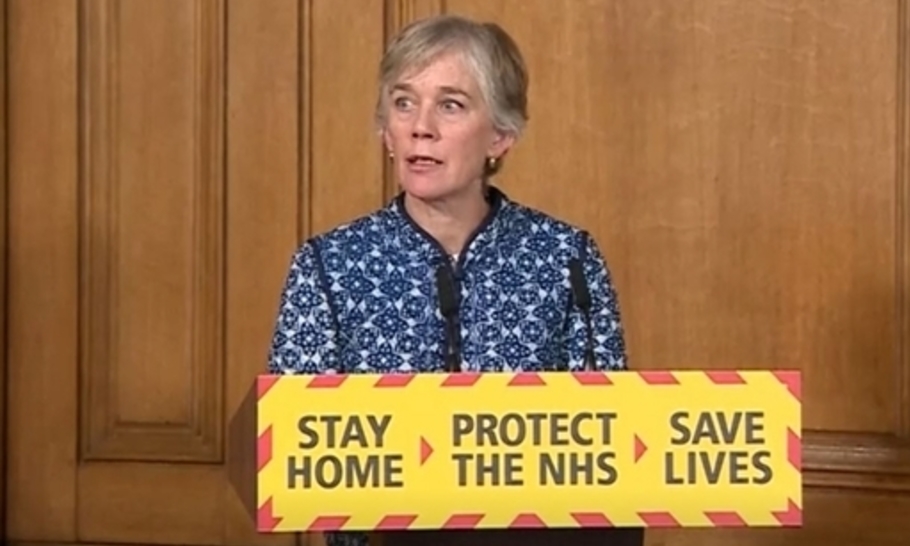With scientific advisers under fire, Angela Maclean is right to be robust

PA Video/PA Wire/PA Images
Even before the lockdown has been lifted, a sharp division is opening up between two camps: the Government and its scientific advisers, who want to prioritise the immediate task of overcoming Covid-19, and the media, supported by assorted experts, who argue that grave mistakes were made at the outset of the pandemic and want to find out exactly what went wrong.
Not unreasonably, the ministerial camp claims that while hundreds are dying every day, it is far too soon to indulge in a blame game. No less plausibly, their critics believe that lack of transparency has brought us to this pass. The former focus on the present danger because the past cannot be changed, the latter dwell on the past for the sake of avoiding mistakes in future. Both sides have some justification, but these two approaches are incompatible.
The tension between the two camps was highlighted at Tuesday’s Downing Street press conference. Under pressure from journalists, Dame Angela Maclean suggested that the phased lifting of the lockdown depends on a capacity to detect and isolate new cases. “The scientists have been very clear in our advice that changes to lockdown… need a highly effective track, trace and isolate system to be in place.” The Deputy Chief Scientific Adviser cast doubt on the June 1 deadline for reopening schools and businesses by insisting that “any change to the social distancing measures should be based upon levels of incidence… not on a fixed date.”
Dame Angela, who has emerged as the most impressive, open and independent of the Government scientists, praised South Korea for having acted quickly to suppress the spread of the virus and said that Britain had a lot to learn from their system. A pilot study on the Isle of Wight has been successful and staff are being recruited, but the UK is still not ready to roll out a national contact tracing regime. There are doubts, too, among ministers about whether the British public will accept quarantine centres for those who test positive. Such centres have been a key element in the South Korean success. Germany, which was also mentioned by Dame Angela as a model for the UK to emulate, has also been rigorous in testing, tracking and tracing, but has allowed those infected to self-isolate at home, not in quarantine centres.
Dame Angela was also frank in her defence of the decision to abandon contact tracing in mid-March. She admitted that, given the very limited testing capacity then available, tough choices had to be made. The decision was taken to focus on testing NHS patients rather than the community. “It was the best thing to do with the tests that we had,” she said. “We could not have people in hospital with Covid symptoms not knowing whether or not they had Covid.”
Her admission was a step towards greater transparency, but was also bound to fuel criticism of the Government. The Environment Secretary, George Eustace, looked uncomfortable at times during the press conference as his scientific colleague spilled the beans. Dame Angela declared that the question of whether Sage, the Scientific Advisory Group for Emergencies, had been secretive “will be a big issue when we have to look back”. But she felt strongly that the question of whether Sage’s minutes should be published now was “not the most interesting conversation” for the moment.
Unfortunately for ministers and their scientific advisers, journalists and other critics find this conversation not only interesting, but have treated the publication of Sage advice as a vital national interest. Sir Patrick Vallance, the Chief Scientific Adviser, is known to favour publication of Sage’s advice on schools ahead of June 1, to allay concerns among teachers and parents. But scientists who sit on the group are reluctant to be exposed to scrutiny.
It was clear from yesterday’s briefing that Dame Angela is determined not to be hung out to dry later, once the blame game begins in earnest. “We have been very focused on trying to give really high quality advice, completely rooted in evidence.” Perhaps nettled by criticism from Sir Adrian Smith, the President-Elect of the Royal Society, she was at pains to emphasise the political independence of scientists advising the Government. By casting doubt on plans to reopen schools at the date announced by the Prime Minister himself, Dame Angela is putting down a marker. If ministers put the cart before the horse by lifting the lockdown prematurely, she is clearly ready to say in public that such measures would have been taken against scientific advice.
Under fire from lockdown sceptics railing against “junk science”, on one side, and the chorus of scaremongers on the other, Dame Angela is nobody’s patsy. Robust, yes; disloyal, no. This pandemic is not over. We must not lose focus on the present and future by arguing about who said what to whom months ago. But the Government needs to be told the truth, even when it is inconvenient.





